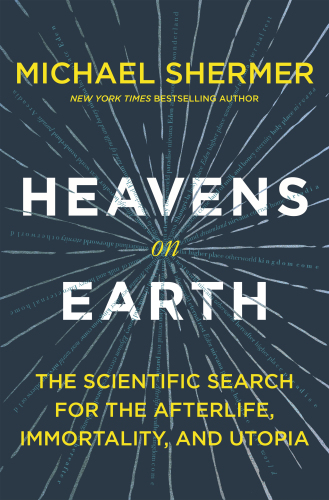
Heavens on Earth
The Scientific Search for the Afterlife, Immortality, and Utopia
فرمت کتاب
ebook
تاریخ انتشار
2018
نویسنده
Michael Shermerناشر
Henry Holt and Co.شابک
9781627798563
کتاب های مرتبط
- اطلاعات
- نقد و بررسی
- دیدگاه کاربران
نقد و بررسی

October 15, 2017
An exploration of "one of the most profound questions of the human condition, one that has driven theologians, philosophers, scientists, and all thinking people to try to understand the meaning and purpose of our life as mortal beings and discover how we can transcend our mortality." Despite never having experienced them, everyone holds strong opinions about death and the afterlife, writes Skeptic magazine publisher and Scientific American columnist Shermer (Skeptic: Viewing the World with a Rational Eye, 2016, etc.) in this intriguing analysis of an area no one takes for granted. Young children don't understand death, and adult circumlocution usually adds to their confusion ("He's gone to a better place..."). By the teenage years, writes the author, "we understand that death is inevitable, universal, and irreversible. At the same time, most people also tend to believe that some part of life may continue into the next life, a tendency reinforced by most religions." More than 100 billion people have died over the past 80,000 years; none have returned to life, and near-death experiences don't qualify. In one of many no-brainers that fill the book, Shermer points out that anyone near death is, by definition, not dead. Another crowd pleaser, reincarnation, becomes a stretch if 10s of billions of wandering souls try to cram themselves into the 7.5 billion bodies currently alive. Since deeply held beliefs are often immune to evidence, the author's blend of common sense, neuroscience, experimental findings, and history will attract few readers expecting a strong argument for the existence of an afterlife. This is a pity because Shermer proceeds to less controversial subjects. Vast life extension violates no natural law, so it may eventually happen. Legitimate scientists, as well as the usual eccentrics, are working on it. From hippie communes to the Soviet Union, attempts to create a perfect society invariably flop, and readers will find Shermer's reasons why entirely reasonable. Finally, the author delivers a moving essay on the meaning of life. Not a polemic but an ingenious popular-science account of how we deal with mortality.
COPYRIGHT(2017) Kirkus Reviews, ALL RIGHTS RESERVED.

November 15, 2017
Shermer, author of The Moral Arc and founder of the Skeptics Society, dives into humanity's deepest questions about life and what happens after death. He explores religious versions of the afterlife and science's attempts to explain it, yet approaches both with caution. Incongruences among different religions are examined, and Shermer suggests that their explanations of life after death do not measure up to scientific scrutiny. Even the secular medical community's mechanical attempts to prolong lifespans and touch immortality are dissected and found imperfect. Much like Shermer's previous work UFOs, Chemtrails, and Aliens, this book also requires strict adherence to scientific methods and measurable observations when dealing with supernatural or paranormal occurrences. Shermer succeeds in not only analyzing human beings' efforts to live forever in a utopian existence, but he ends the journey by encouraging readers to seek the forms of heaven which exist around us, in our own lives. VERDICT The comprehensive scope of this book's topic lends itself to readers who are looking for multiple religious points of view, whether for scholastic or personal research.--Bonnie Parker, Southern Crescent Technical Coll., GARemembering those who served, a revolutionary reformer, a life in poetry
Copyright 2017 Library Journal, LLC Used with permission.

December 15, 2017
More than three-quarters of all Americans, including a third of atheists and agnostics, believe in an afterlife. Prolific author and publisher of Skeptic magazine Shermer (The Moral Arc, 2014) explores this belief by reviewing religious approaches to immortality and reincarnation as well as reports of near-death experiences. He firmly believes in creating heaven here and now and actively works to debunk faith in life after death, looking to neuroscience, which shows that our soul, as defined by consciousness, memories, and sense of self, is connected to our physical brain and cannot exist when the body dies. Shermer visits various scientific and pseudo-scientific organizations working to extend the human life span through cryonics, in which bodies are frozen with the hope that advancing science will allow them to reawaken in the future, or via digitally encoding brain functions with the prospect of downloading one's consciousness in a computer. Far from being enamored by these techniques, Shermer argues compellingly that awareness of our mortality leads us to live purpose-driven lives, since our legacy may be the only thing that survives our deaths.(Reprinted with permission of Booklist, copyright 2017, American Library Association.)

























دیدگاه کاربران